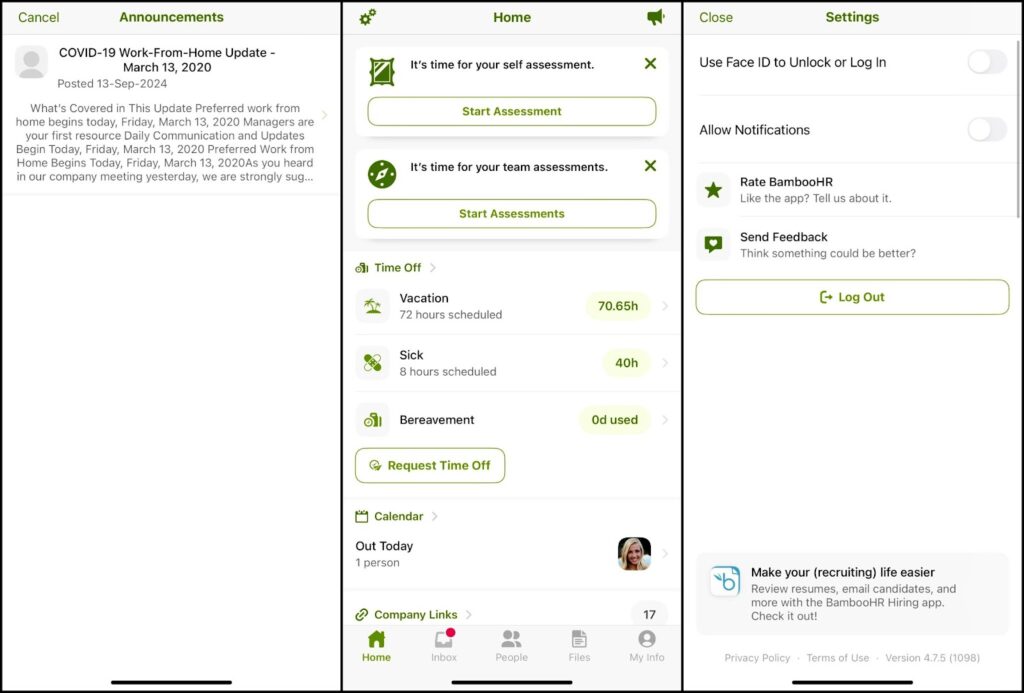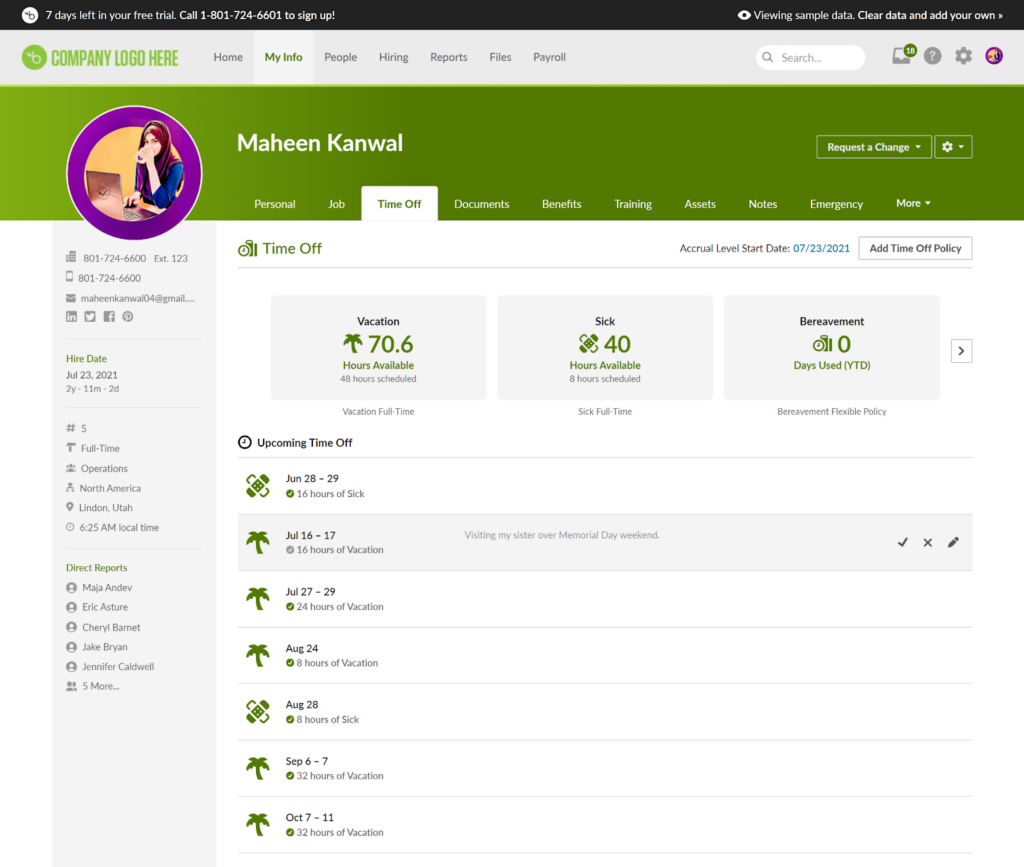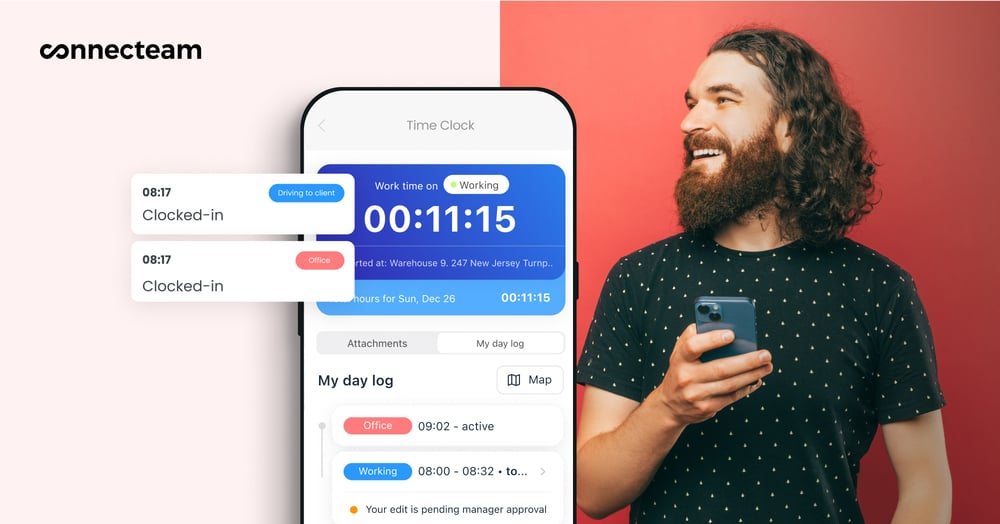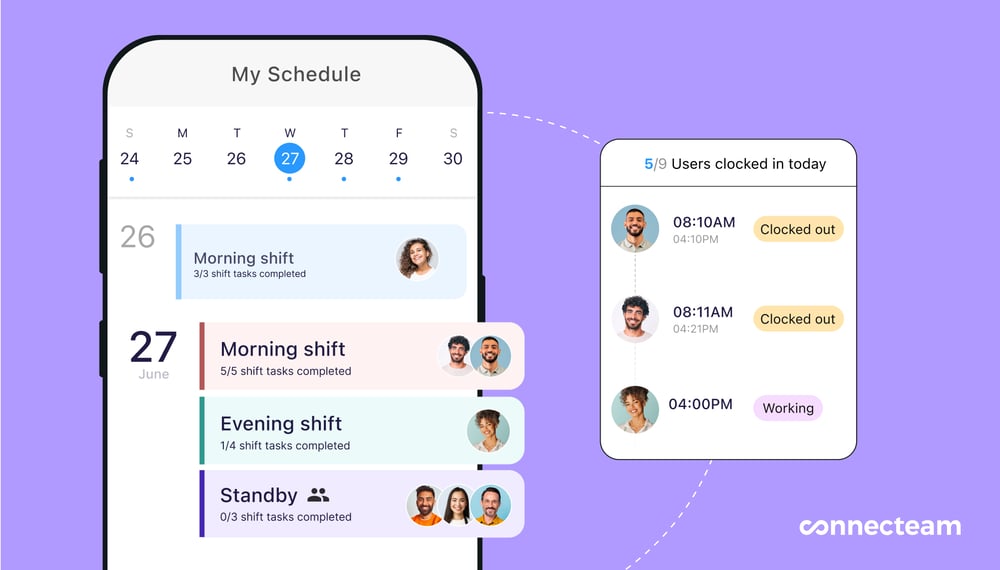BambooHR and Homebase are both popular employee management tools with strengths and flaws. One boasts stronger time off management, while the other offers more comprehensive, built-in scheduling.
The right time employee management tool can make or break your office administration.
Whether you’re scheduling shifts, tracking hours, managing PTO, or just trying to keep everything running smoothly, your software needs to be simple, reliable, and tailored to how your team actually works.
In this article, I break down 2 popular solutions, BambooHR and Homebase, to uncover which would be better for your team.
A note about our method: All product comparisons and verdicts in this guide are based on hands-on testing by our expert team. Every screenshot was taken from real use during our evaluation.
At a Glance: Quick Summary
BambooHR is a popular employee and PTO management tool. It’s good for companies just starting out or those that value a simple HR solution. However, I feel it’s overly reliant on integrations.
Homebase is a comprehensive, feature-rich employee scheduling and time tracking tool. It’s best for low-location, high-headcount businesses or anyone looking to streamline HR solutions. Its pricing structure won’t work for everyone, though.
Pricing and Plans
| Plan Type | BambooHR | Homebase |
| Free Plan | ❌ | Basic $0 for 1 location and up to 10 employees Includes basic scheduling, time tracking, employee management, and POS integration |
| Starter | Core Contact for pricing Includes HR data and reporting, hiring and onboarding, time off and benefits tracking, employee experience, and Compliance Intelligence by VirgilHR | Essentials $24/location for unlimited users Includes advanced scheduling, advanced time tracking, and team communication |
| Pro/Premium | Pro Contact for pricing Adds performance management and employee community | Plus $56/location for unlimited users Includes hiring tools, advanced PTO features, and user permissions |
| Advanced | Elite Contact for pricing Adds compensation management, custom dashboards and analytics, HR benchmarks, and premium support services | All-in-One $96/location for unlimited users Includes labor cost management tools and HR compliance features |
BambooHR doesn’t have upfront pricing. When we reached out to get a quote, we were redirected multiple times, ultimately getting nowhere, which was disappointing.
Homebase is much more transparent. Its pricing structure is based on location, as opposed to headcount. This is great for scaling teams at a single location, as they won’t be penalized for growing their business.
I can’t comment on whether BambooHR offers good value since I don’t know what it costs.
I think Homebase offers a good range of tools for businesses needing a comprehensive HR solution, and it’s probably worth the cost.
My only reservation would be that location-heavy, employee-light businesses may not benefit from the offering like a location-light business would. For example, an accountancy consultancy with 1 location and 25 employees stands to gain more than a retail company with 5 small locations and only a couple of employees at each.
Both companies offer a 14-day free trial, which I appreciate. Homebase also offers a free plan that’s limited to 1 location and 10 users.
Pros and Cons
Here’s where each solution shines or falls short.
BambooHR pros ✅
- Detailed employee data management. Your team can track and own their data with BambooHR’s self-service tools.
- Great security features. With encryption, 2-factor authentication, GDPR and HIPAA compliance, and detailed permissions customization, BambooHR is a great choice for security-conscious businesses.
BambooHR cons ❌
- Lackluster customer and sales support. We had a few slip-ups with BambooHR’s customer service. This, coupled with the need to interact with an AI chatbot before receiving human assistance, made it tough to get support when we needed it.
- Time tracking is an add-on. I find it frustrating that this core feature is available only as an add-on requiring its own widget.
Homebase pros ✅
- Communication tools. Homebase’s in-app messenger is a great tool for creating one-on-one, group, and team-wide messages.
- Built-in payroll. Homebase’s zero-click auto-payroll is a game-changer for busy managers.
Homebase cons ❌
- Reporting and analytics. The level of customization is somewhat lacking.
- Limited customer support. Only users on certain paid plans can access on-demand telephone support.
Use Cases
Which tool is right for you depends on your business goals. Let’s look at the best use cases for both BambooHR and Homebase.
Choose BambooHR for:
- Strong time off management. Employees can request leave and view balances, while managers can approve requests and generate detailed PTO reports to analyze PTO usage, trends, and more.
- Audit-ready document storage. BambooHR’s smart file management tool makes it easy to find documents when you need them.
Choose Homebase for:
- Intuitive employee scheduling. Homebase lets you copy and paste schedules, drag and drop shifts, and set recurring patterns.
- Multi-location time tracking. Managers of multiple sites can easily track hours, breaks, and clock-ins across locations from one central tool.
Side-by-Side Feature Overview
Both BambooHR and Homebase offer all-in-one employee management HR solutions for small and growing businesses. With functions for time tracking, timesheets, PTO monitoring, and more, each tool has something to offer.
Below, I break down the most important features for field-based and deskless teams, measuring how each platform stacks up in real-world settings.
Time tracking and payroll – Winner: Homebase
BambooHR enables employees to track their working hours by quickly entering their hours worked per day. This time is then automatically loaded onto a timesheet where it can be easily sent to payroll. I really appreciate how managers can also upload their employees’ worked hours, saving their teams the hassle of back-and-forth if they’ve forgotten to clock in.
The challenge is that BambooHR allows time tracking only through an add-on. When we tested this feature, we discovered that it requires a separate widget, which you must download to manage workers’ time cards. This extra step feels clunky and unnecessary.
BambooHR’s built-in payroll feature (also an add-on) lets approved timesheets flow directly into payroll runs.
Homebase allows for detailed time tracking across multiple locations and devices. I like the flexibility it offers, allowing workers to clock in from phones, tablets, desktops, and POS systems.
I also appreciate the level of detail Homebase offers. You can request workers’ GPS locations when they clock in, and even ask them to take a quick photo to ensure they’re really where they say they are. It’s a clever way to prevent buddy-punching without feeling heavy-handed.
Any worked hours entered are automatically uploaded to employees’ digital timesheets, reducing manual errors. Managers can edit entries, add notes, and quickly process payroll (which is built right into Homebase). Historical timecards are accessible for audits.
Ultimately, Homebase offers more flexible, built-in time tracking with stronger safeguards and fewer extra steps.
Employee scheduling – Winner: Homebase
BambooHR’s scheduling features are available only through a third-party integration with Deputy, meaning you must manage 2 separate platforms. This adds extra steps and makes the system feel a bit disconnected. You’ll also need to consider the additional cost of this integration and whether it’s commercially viable for your business.
That said, the scheduling tool is pretty slick. With recurring shift capability and availability-driven scheduling, the scheduler helps managers avoid clashes and manage last-minute changes.
Homebase, on the other hand, has an integrated scheduling solution. With the ability to copy and paste past schedules, create recurring shift templates, and drag and drop shifts into place, managers can build schedules quickly and intuitively. Team members can also input their availability, be notified of schedule changes instantly via the app, and pick up additional shifts based on their schedule preferences.
That said, while the availability feature sounds great in theory, it didn’t quite deliver in practice. When we tested it, our tester, who was testing the employee side of the app, set a recurring availability preference starting on a future date—but it took effect immediately and didn’t repeat. In a real-world setting, that kind of hiccup could easily lead frustrated team members being scheduled for shifts they don’t want to work.

Hiccups aside, I think Homebase’s offering is easier to use and far more efficient.
Mobile app – Winner: BambooHR
BambooHR has a clean and clear mobile app. Although a few of the desktop features aren’t available on the app, overall, it’s easy to navigate and covers most of the essentials. Advanced features like app permissions, reporting and analytics, and timesheet approvals require desktop access.
My main concern with mobile apps is whether they’re available offline. I find it frustrating when I go to make changes, like logging worked hours, on my phone, only to realize I need a stable internet connection.
Most features are available offline on BambooHR’s mobile app. But, I’d like to see this extended to all features. Key actions like adding new employees, completing training courses, and modifying app settings all need an internet connection, which can be limiting if you’re on the go.
However, Homebase doesn’t offer offline access at all on its mobile app. You need a stable internet connection to make any changes or even log into the app, which I dislike, as this means on-the-go managers or employees working in low-signal areas can quickly run into issues—like being unable to clock time or check important information (like schedules).
This lack of offline functionality is a small but significant drawback that I think gives BambooHR the edge.
PTO and time-off management – Winner: Tie
BambooHR offers a flexible time-off management dashboard, which you can access on both the mobile app and desktop versions. Employees and managers can pick from various types of leave, like FMLA, bereavement, PTO, sick leave, vacation leave, and more. The only downside is that any customization beyond the standard categories can take a bit of setup.
When we tested BambooHR, we were impressed with the balance calculator. Once an employee requests time off, this automatic balance calculator will update their remaining time off in real time, helping everyone stay on top of their balances without manual tracking. Approvals are straightforward, too. Managers get notified instantly of requests and can approve or deny requests with just a click. BambooHR also offers detailed reports on used time off, time off balances, and scheduled time off.

Homebase also allows you to set limits and rules for time off requests, meaning you can manage when your team can take time off and how much notice you require without endless back-and-forth. Your team can also request time off through the app, and managers can approve or decline requests with 1 click. Once approved, the time off is automatically added to the schedule to prevent conflicts and accidental overlap.

I think the platforms tie in this area. BambooHR is great for in-depth HR reporting, offering a great level of detail for presenting PTO data to the board. But, if your focus is simply making sure everyone gets their long weekend, Homebase has you covered.
Reporting & analytics – Winner: BambooHR
BambooHR boasts over 49 unique reports, including headcount, time off, time tracking, payroll, and benefits reports. This granular detail gives managers and HR teams real visibility into workforce trends, helping them make informed decisions without having to manually compile data. We found generating these reports to be easy.
Reports can be customized, scheduled, and shared easily, which is a huge time-saver and great for managers just starting out. However, the tool doesn’t offer any AI analytics or data interpretation support.
Homebase also offers a range of data analytics tools. What makes this softwaregreat compared with BambooHR is the incorporation of a data dashboard. I like to be able to see real-time insights all in one place, rather than creating my own graphs and charts. It’s a more visual, accessible approach that makes it easier for busy managers to spot issues and take action quickly.
That said, when we tested Homebase, our tester was disappointed with the lack of customization. You can’t pick specific time periods for certain reports or build custom reports based on your needs. So, ultimately, Homebase doesn’t match BambooHR’s depth, but some users might prefer its at-a-glance insights.
Integrations – Winner: Tie
BambooHR integrates with a wide range of over 125 tools, including popular platforms like Deputy, QuickBooks, and Slack. This broad integration library is designed to enhance flexibility and customization. While it’s great to have a choice, some of the integrations feel essential rather than optional. For example, some basic functions offered by competitors (like scheduling and workflow automation) require third-party tools to work properly with HR. This is a drawback for me.
Homebase integrates with over 25 software solutions, including POS systems and job boards. The difference between these integrations and BambooHR’s is that Homebase’s integrations genuinely feel like enhancements to its offering. The core tools (scheduling, time tracking, and team communication) are already built into the platform, so the integrations are there to expand what’s possible and not to fill gaps.
But I can’t deny that 125 integrations seem much more attractive than 25, even if some of those options are compensating for missing core features. So, I’ll call this a tie. BambooHR brings the quantity, but Homebase offers quality.
Labor law compliance – Winner: Homebase
Homebase offers built-in labor law compliance tools like break reminders, overtime alerts, and auto-scheduling that prevents violations. However, these features are only available on their most expensive, All-in-One plan.
BambooHR also offers break reminders and overtime alerts as part of its time tracking add-on. Its more extensive compliance features require third-party integration through VirgilHR to work. This adds complexity and extra cost, making it unsuitable for businesses on strict budgets. That said, the offering is comprehensive and includes personalized employment law guidance, document management, and automated policy updates tailored to your location and industry. I think this could be great for heavily regulated businesses that want built-in legal support and automated compliance updates without relying solely on internal HR expertise.
For teams that need straightforward labor law support without extra integrations, Homebase takes the lead, but the more extensive features offered by BambooHR might appeal to highly regulated businesses.
Ease of use – Winner: Tie
BambooHR itself is simple and easy to use. The layout is clean and clear, and most everyday tasks can be completed in just a few clicks. The only part that’s tricky to get your head around is the number of integrations and how they fit into the overall workflow. It can take a bit of time to understand which features are built-in and which require third-party tools (and some integrations may have their own learning curve).
Homebase also has a clear, easy-to-follow layout. Because it includes more features out of the box, it may take slightly longer to learn upfront. However, for the sake of having it all in one place, those extra few days of familiarizing yourself with the features are worth it.

BambooHR is easier to learn, but Homebase becomes simpler to use over time thanks to its all-in-one design. I’ll call it a draw.
User Ratings
User ratings can shed some light on how much everyday users value the platform’s usability, reliability, and overall experience.
BambooHR
Homebase
Security & Data Compliance
Security and compliance are key to running a safe, secure business. Let’s compare BambooHR and Homebase to see how they measure up.
| Category | BambooHR | Homebase |
| Data Encryption | ✅ | ✅ |
| GDPR Compliant | ✅ | ❌ |
| HIPAA Compliant | ❌ | ❌ |
| 2FA Available | ✅ | ✅ |
| Custom User Permissions | ✅ | ✅ |
| Hosting Region | US, Canada, or Ireland | US/EU (TBC) |
While both BambooHR and Homebase are security-focused HR systems offering data encryption and 2-factor authentication (2FA), BambooHR has a slightly better offering for those in regulated industries or handling sensitive employee data.
BambooHR supports country-specific compliance tools and training and development reports. These are ideal for businesses in regulated industries like construction or warehousing. It’s also GDPR compliant, making it great for businesses requiring enhanced security. However, it doesn’t currently offer HIPAA compliance, so it isn’t suitable for US healthcare businesses looking to store or communicate protected health information on the app.
There’s no mention of GDPR or HIPAA on the Homebase website, which leads me to believe it’s not compliant with these laws. There’s also limited publicly available information on where Homebase hosts its data, which could raise concerns for businesses operating internationally or with strict data residency requirements.
If your business is subject to specific compliance regulations, especially around employee data protection, BambooHR offers more reassurance out of the box.
Setup and Onboarding
When we tested BambooHR, we found it easy to set up and navigate. The features are where you’d expect them to be, even if you aren’t a tech expert, and I like that the interface stays consistent between desktop and mobile. I also appreciate that there’s a range of onboarding videos on YouTube. If you ever get stuck, it’s easy to find quick guidance without having to contact support.
Homebase also has a clear and easy-to-follow interface, and our tester appreciated its simplicity. The basic setup, like configuring payroll and adding team members, is easy thanks to the handy guides. There are tons of step-by-step guides available online for self-paced learners, and various YouTube videos for more visual learners. I also appreciate how organized the help center is, and there’s a handy search function if you know exactly what you’re looking for.
Support and Customer Service
| Support Type | BambooHR | Homebase |
| 24/7 Chat | ✅ | ❌ |
| Phone Support | ✅ | ✅ |
| Email Support | ✅ | ❌ |
| Help Center | ✅ | ✅ |
Both BambooHR and Homebase offer solid customer support, but they cater to slightly different needs.
BambooHR stands out with its comprehensive offering. However, please note that while BambooHR advertises 24/7 live chat support, I’d disagree with this label. While the chat is available 24/7 for basic inquiries, for anything more complicated, you must book a time with a customer service agent, and agents aren’t available around the clock.
For instance, when we reached out to live chat support, the chatbot informed us that no agents were available and had us select a time slot to receive a callback. (Fortunately, we received a reply within 1 minute once an agent became available.)
Homebase also offers live chat and phone support, but only during office hours, and we were disappointed to discover that both forms of support are restricted to the Essentials plan or higher. While the help center and training resources are strong, the lack of access to direct support on lower-tier plans may be a drawback for some. That said, when we tested email support, we received a reply within 24 hours, which was nice.
Overall, BambooHR offers more support channels and broader availability, even if live agent access isn’t truly available 24/7.
🏆 Who Wins: BambooHR or Homebase?
| Choose BambooHR if you… | Choose Homebase if you… |
| Need a reliable PTO tracker. | Have tons of employees but work across 1 or 2 locations. |
| Are okay using more than one system for more complex work. | Need a reliable, all-in-one time tracker. |
| Are a medium-sized business looking to formalize HR tools. | Are a growing business looking to keep things cost-effective. |
| Read our in-depth BambooHR review | Read our in-depth Homebase review |
Both tools are pretty evenly matched.
BambooHR has an excellent offering in terms of compliance, user support, and time off management. However, the need for third-party integrations to unlock some core functionality makes it feel less streamlined, especially for smaller teams or businesses looking for simplicity.
Homebase, on the other hand, packs a lot into one platform. With built-in scheduling, time tracking, PTO, and communication tools, it’s a smart choice for growing teams that want to keep things easy and efficient. But its per-location pricing structure won’t suit all businesses.
Connecteam vs. BambooHR vs. Homebase
Looking for the best of both worlds?
Connecteam combines the simplicity of BambooHR with the detail of Homebase at a much lower price point.
| Feature | Connecteam | BambooHR | Homebase |
| Time Tracking | ✅ | ✅ | ✅ |
| Scheduling | ✅ | ✅ | ✅ |
| PTO Management | ✅ | ✅ | ✅ |
| Free Plan | ✅ Up to 10 users | ❌ | ✅1 location, up to 10 users |
| Support | ✅ 24/7 live chat | ✅ | ✅ |
| Drag-and-drop employee scheduling | ✅ | ❌ | ✅ |
| GDPR and HIPAA compliance | ✅ | ❌ | ❌ |
Time tracking
Time tracking is one of Connecteam’s core features. With a GPS-enabled employee time clock, real-time shift tracking, and automatic uploads to a digital timesheet, you can easily monitor work hours without chasing timesheets or guessing who was on site.

I really appreciate the real-time notifications for late or missed clock-ins, which are great for staffing and safety purposes.
Employee scheduling
With a drag-and-drop employee scheduler, a 1-click auto-scheduler, schedule templates, and conflict detection, Connecteam is a busy manager’s best friend. It also enables shift swapping, open shifts, and more.

You can also set rules to prevent scheduling conflicts and send instant updates to staff through the mobile app, which I really appreciate when I’m managing deskless teams.
PTO management
Connecteam is very competitive with its own time off management and time off tracking tools.
I like how you can set custom policies for vacation, sick leave, or personal days, and employees can request time off directly through the app. You can tailor your policies based on your state or location, ensuring you’re complying with any relevant labor laws. Approved hours are automatically uploaded to the schedule, which helps avoid accidental overlap.
Customer support
Connecteam also delivers the most responsive and personalized support of any platform in this comparison. Unlike Homebase, which restricts support to business hours and often draws complaints about slow responses, Connecteam offers fast, in-app live chat support to all users, including those on the free plan. And unlike BambooHR, whose live support isn’t always truly live, Connecteam’s support is responsive and available around the clock. You can typically expect to receive help within 5 minutes of making a query.
What really sets Connecteam apart is its Connecteam Pros program: a network of certified partners who offer tailored services like setup, training, and ongoing consulting for a simple hourly fee. Neither Homebase nor BambooHR offers anything like this.
Price point
My favorite thing about Connecteam is the price. With a free-forever plan for businesses with under 10 employees and a 14-day free trial for larger businesses, it’s a really accessible option, especially if you’re just getting started or trying to keep costs down. Paid plans are also extremely affordable, starting at just $29/month for the first 30 users. You get tons of value without the hefty price tag, and that’s a rare find in HR software.
That’s not all!
Connecteam offers a range of additional features that make people management a breeze, including staff document storage, a company knowledge base, customizable digital forms and checklists, org chart software, an in-app chat and newsfeed, an internal ticketing system, and so much more.
Ultimately, Connecteam is a great solution, especially for deskless teams. And it doesn’t charge extra per location or lock key features behind expensive add-ons like Homebase and BambooHR do. I think it delivers the most seamless experience for both admins and employees, with a variety of great tools, clear pricing, and exceptional support at every tier. If you’re looking for an all-in-one solution that grows with your team, Connecteam is the best fit.
FAQs
Does BambooHR have a free plan?
No, BambooHR doesn’t currently offer a free plan.
Is Homebase free for employers?
Homebase offers a free plan for up to 10 users across 1 location.
Is BambooHR worth it?
BambooHR is a good option for small to medium-sized businesses. However, you may get more for your money with an app like Connecteam.
How much does BambooHR cost per month?
BambooHR doesn’t have transparent pricing. You must reach out to customer services for a custom price.

